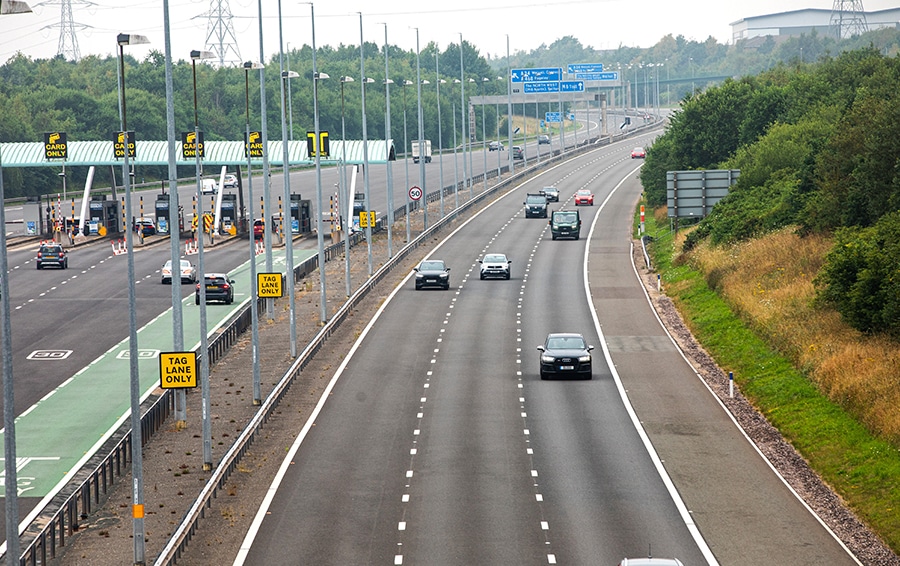In a single year, the M6toll provides a £400m boost to the West Midlands economy through its role as a critical national corridor, according to a new independent report commissioned to look at the economic impact of the road.
The report titled ‘M6toll: a regional and national economic catalyst’ was carried out by leading strategic economics consultancy Vivid Economics and is the first economic impact assessment of a toll road conducted by the Vivid Economics team.
By utilising existing Government approved data, including figures from Highways England, the Department for Transport and the Land Registry, the study assessed the contribution of the M6toll to the regional economy and the wider national road network.
Based on its ability to increase capacity and connectivity, the study reports that the M6toll is responsible for a £400m boost to the West Midlands regional economy, driven by economic productivity gains and job creation.
As a hugely important part of the country’s strategic road network, the M6toll is a major catalyst for investment from expanding firms, with 1,200 firms locating to the West Midlands region and 500 jobs created as a result of the road’s connectivity and reliability.
The Vivid Economics study also calculates that the M6toll has helped boost wages by 1.4% – equivalent to approximately £280 million in additional total wages per year for the region.
Furthermore, assuming a median UK income of £29,000, the additional 5,000 jobs created by the M6toll has resulted in £140 million a year in additional salaries.
When assessing the M6toll’s contribution to national infrastructure, the study found that in providing a free flowing and reliable route, the M6toll encourages the switching of through traffic to the tolled solution – saving business and individual customers three million hours a year and taking traffic off congested local roads.
The study also highlights the importance of the M6toll as a critical artery for effective movements through the region, offering a reliable and congestion free route – moving up to 85% of the journeys travelling through the congested M6 corridor and helping free up capacity for local journeys – fulfilling a key purpose for which the road was built.
The M6toll is further commended for keeping the region and country moving with substantial journey time savings compared to alternative congested alternative routes. This includes an average journey time saving of 41%, and a 10-15 minute journey time saving compared to local A roads such as the A5 and A38.
James Patterson-Waterston, Director of Cities and Infrastructure at Vivid Economics said:
“Vivid Economics is pleased to have supported MEL in this important study to assess the socio-economic impacts of the M6toll in an independent and robust way.
“While we have followed national government guidelines and methodologies, the unique nature of the M6toll has also required that we undertake a deeper assessment of the role it plays in regional economic development.
The M6toll plays a critical economic role as both a national and regional asset. The road facilities national north-south freight across the UK, minimising the flow of HGV traffic through the crowded urban M6 corridor. Regionally, the road plays an important role in facilitating access to jobs and markets for residents.
Furthermore, our work has showed the positive benefits this increased connectivity has had on regional productivity, job creation and business performance, enhancing the impacts for local communities.”
Andy Cliffe, M6toll Chief Executive said: “The study was commissioned to provide a comprehensive, objective and transparent assessment of the socio-economic impact of the M6toll.
“By using nationally benchmarked methodologies, Vivid Economics has provided strong quantifiable evidence of this impact and we welcome its findings.
“Through job creation, business expansion and increased salaries the M6toll is a major economic driver for the West Midlands, providing a £400m boost to the regional economy and without any direct cost to the public purse.
“The report also acknowledges M6toll’s role in reducing congestion, taking HGV vehicles off local routes and encouraging more local leisure journeys, all of which form part of Midland Expressway Ltd’s (MEL) strategic vision for the road.
“While we welcome these findings, we will not use them as a reason to rest on our laurels or put the brakes on our ambitions. By delivering strategic initiatives such as our Road Ahead programme, we continue to move forward in providing a reliable and effective alternative route through the congested West Midlands and improving the UK’s connectivity.”
Since opening, the M6toll has delivered on its core objectives and initial five-year Highways England targets – serving as an effective alternative route through the congested West Midlands and improving the UK’s connectivity. The M6toll remains for businesses and individuals, locally and nationally, a fast, reliable and safe route to, through and around the Midlands.
The M6toll is responsible for 15-18 million journeys per year that otherwise would be on the M6 or other local roads. In particular, by moving such a high volume of long-distance traffic off the M6, the M6toll has freed up the M6 to provide this capacity for local people to access jobs and leisure opportunities within Birmingham and the wider region.
A big data study carried out in 2019 showed drivers on the M6toll reflect a similar demographic profile to those using the rest of the UK arterial road network. Viewed alongside market penetration data, the study demonstrated how the M6toll is the preferred route for up to 85% of car drivers travelling long distance through the midlands.
Midland Expressway Ltd (MEL), which operates the M6toll, is seeking to encourage more people to use the M6toll for local and regional journeys through the development of various initiatives, offers and saver products.






